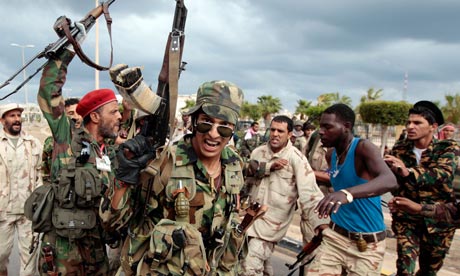@feb17libyaFeb17Libya
Libya war reaches endgame with 100 loyalists left fightingbit.ly/r0XriI #libya
 By: Peter Beaumont
By: Peter BeaumontThe two men are singing in the back of a pick-up truck, sitting on the rails, their legs resting on a blanket that seems oddly lumpy. Sticking out from beneath it are two pairs of feet, one bare, one wearing socks. They are the feet of two pro-Gaddafi fighters killed in the fighting in the coastal city of Sirte.
Thursday was a day of deaths on both sides. Government forces trying to enter the last pocket of Sirte held by pro-Gaddafi fighters were bogged down in a narrow street flooded with sewage and water.
Sirte is an unremarkable town, its importance inflated by the fact that the deposed Libyan leader was born nearby and counts its main tribe among his staunchest supporters.

Rebel fighters celebrate after their forces capture a Gaddafi fighter during fighting in the centre of Sirte. Photograph: Thaier Al-Sudani/Reuters
But its fate is now being keenly watched around the world. The rebel government in Tripoli has declared – as foreign secretary William Haguetold MPs in London – that its fall will mean the liberation of the entire country and trigger the start of a political process to build a new democracy.
A street corner where, on Wednesday, it had been possible to walk and stare into a narrow canyon of shattered buildings, was at the centre of the battle. Instead of walking, one had to crawl as the pockets of defenders fired RPGs into buildings and at cars.
In response government fighters pulled back a little and brought in tanks, placing them on a low, grassy rise crowned with a shattered white pavilion from where they could blast directly into the rooftop positions, setting fires, nibbling away at the concrete, filling the air with noise and dust.
For the pro-Gaddafi fighters it is a hopeless situation. There is nowhere to go except deeper into an area of the city 750 metres wide by 500 metres deep that runs along the coast from the television station – with its pair of wrecked and punctured dishes – to the edge of District Two, overlooked by the pavilion and its sagging roof.
The choices faced by Gaddafi’s loyalists are stark: to fight on and end up dead under a blanket like the men in the pick-up truck, or to come out, as one fighter in uniform did on Thursday morning.
“You see that captive?” asked Ismail Taweel, a middle-aged fighter from the Harbus Katiba, a unit famous in Libya from the siege of Misrata, most of whose colleagues are in the desert near Bani Walid. He indicated a burly, bearded man with a face bruised from beating, crying with fear.
“I want to ask him how many of them are left. I’ve just come from speaking to another captive. A Sudanese. He said there were few left and most were wearing green uniforms. We’re fighting the real soldiers now, not the mercenaries. He said some were trying to escape.”
“They have one and a half square kilometres at most,” explained Dr Salah al-Obeidi, a commander from Benghazi who was a dentist before the war. “There are a hundred fighters, maybe a little more, holding us up. That is all.”
Others put the number at 200. “They are finished. All they can do is surrender. There has been no attempt to negotiate with them,” Obeidi said. “We don’t negotiate with terrorists. We hear them talking on their radios. Talking about ‘rats’ and killing infidels.” Obeidi had a sheep in the back of his truck, ready to be slaughtered for the victory feast. When victory finally comes.
On the roof of an unfinished building with a yellow water tank on top and the green flag of the Gaddafi troops, muzzle flashes were visible. Later the tanks tried to land their shells on top of it.
Matthew VanDyke, the film-maker turned fighter who spent months in a Gaddafi jail, was at the front again on Thursday. “I was at the opening of the street yesterday fighting in my vehicle. Then we forced them back to the last buildings in the street, but now they have moved forward to the middle of the street again. The water comes up to the running boards. It is thigh deep when you go in and you can see the bullets hitting it.
“A lot of the Gaddafi fighters have slipped out with the families escaping – guys you see of military age.”
The Gaddafi forces left in Sirte cannot break out: there is no one to join. They cannot retake a town vast areas of which are now under government control.
Why they fight on seems baffling to many of those facing them in these last days and hours of the battle for Sirte and indeed the war for Libya.
As evening approached the dynamic of the stalled fighting seemed to change. An advance by government forces through an area of houses on the coast pushed from east to west beyond a tall aerial. Out of sight beyond a flooded series of streets it was possible to measure the progress only by smoke and by the sounds of the truck-mounted anti-aircraft guns and the explosions of tank fire and the recoilless rifles moving – it appeared – inexorably into the pocket.
This is a battle that the government fighters now cannot lose. The onlyquestion is how many more must die before their victory is complete.
